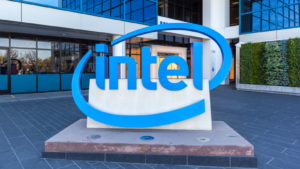Thus, investing in quantum computing stocks is quite promising, considering the development of the industry. Some of the breakthroughs in quantum computing hardware include the creation of superconducting qubits and error correction software for larger quantum computers. There has been progress in increasing the qubit coherence times and combining classical and quantum computing to solve real-life problems.
Many of these quantum computing stocks trade at reasonable valuations. Now is a great time for investors to consider these options to grow their wealth. So here are three quantum computing stocks to consider.
IBM (IBM)

IBM (NYSE:IBM) is one of the leading companies in the race toward quantum computing. It’s constantly pushing forward to create efficient quantum systems. The company’s delivery of the first 1,000-qubit quantum chip in 2023 proved incredible advancements are being made in this field.
What’s more, IBM’s approach has changed significantly since the company decided to focus on the miniaturization of quantum chips and their increased accuracy rather than increasing the number of qubits. While quantum computing still has a long way to go before it is practically usable, it has the potential to be used in fields such as cryptography, optimization, and simulation. This is where computing accuracy is paramount.
Thanks to its technical competence, cooperation with other industries, and conceptual approach to the development of quantum computing, IBM has the potential to lead the way forward.
Financially and technically, IBM pays a solid and growing dividend and has a low beta, making it a defensive pick in one’s portfolio.
Intel (INTC)

Intel (NASDAQ:INTC) has become one of the frontrunners in the race to build quantum computers through the application of transistor-based design and semiconductor manufacturing. Thus, by transferring the methods for creating and verifying conventional chips to silicon-based quantum computers, Intel has made a significant leap forward in its creation.
This is because the company is using silicon spin qubits, which are somewhat similar to the familiar semiconductor transistors. This allows the company to use its advanced CMOS fabrication facilities to place millions or even billions of these qubits on a single chip.
Intel’s progress in developing a 12-qubit silicon chip on a 300mm wafer with an impressive 95% yield rate proves its capacity to meet the stability standards of quantum computers. Also, Intel has perfected the cryogenic wafer probing technique. This allows it to test its quantum devices and make necessary adjustments faster.
INTC could be one of the top quantum computing stocks to consider to include an award-winning brand your portfolio.
IonQ (IONQ)

IonQ (NYSE:IONQ) is a leading developer of quantum computing systems using trapped ions. This approach could potentially enhance the reliability of its quantum computations.
IonQ has a strong technological advantage and owns 74 US-issued patents and 163 pending applications covering its quantum computing solutions. It is also engaged in the process of developing its quantum hardware for the commercial market, through which is available on the major cloud platforms and has signed several strategic partnerships,
One of the best things about IONQ is its financials are in good shape. This is more than what can be said for other companies that are exploring more experimental strategies.
As per its Q1 results, IonQ has high gross margins and increasing orders for quantum systems. The company expects to achieve net income before seeking more capital and thus prepare for long-term development. These factors make IONQ one of those quantum computing stocks to buy.
On the date of publication, Matthew Farley did not have (either directly or indirectly) any positions in the securities mentioned in this article. The opinions expressed are those of the writer, subject to the InvestorPlace.com Publishing Guidelines.
Matthew started writing coverage of the financial markets during the crypto boom of 2017 and was also a team member of several fintech startups. He then started writing about Australian and U.S. equities for various publications. His work has appeared in MarketBeat, FXStreet, Cryptoslate, Seeking Alpha, and the New Scientist magazine, among others.
